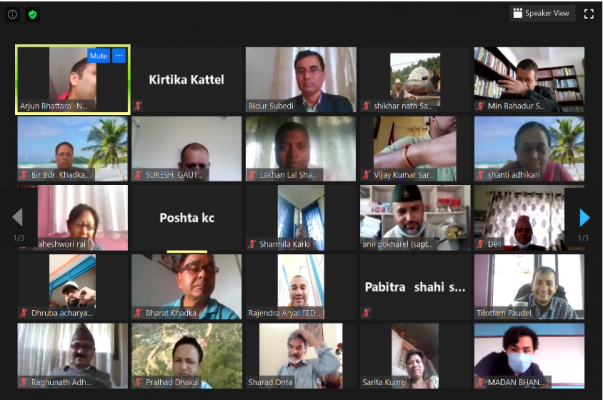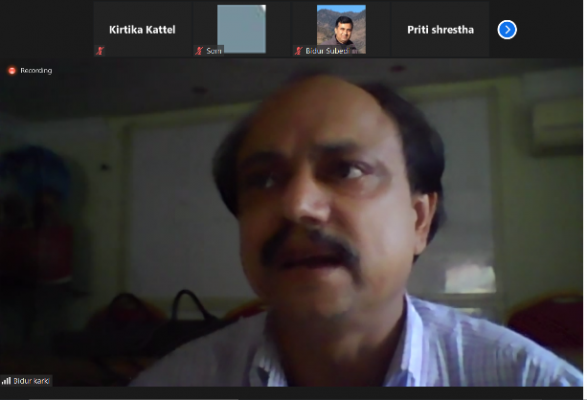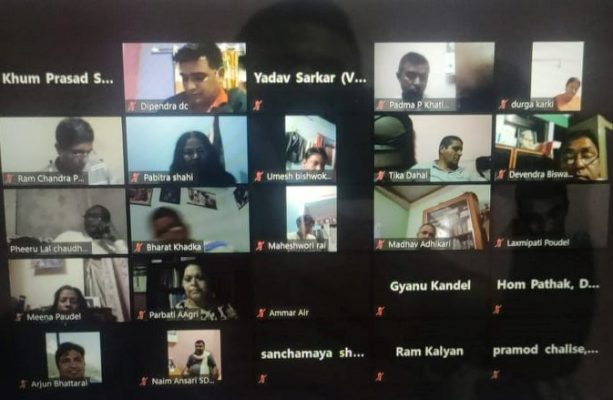“Fighting Inequality in Nepal: Road to Prosperity”
Humanitarian Accountability Monitoring Initiative (HAMI) launched report on “Fighting Inequality in Nepal: Road to Prosperity” at Alfa House, New Baneshor, Kathmandu on January 11, 2019. The program was chaired by Rem BK, Core Committee Member of HAMI and the chief guest was Dr. Puspa Raj Kadel, Vice-Chairman, National Planning Commission. Hari Sharma, political analyst shared his critical observation on the report and Dr. Padma Prasad Khatiwada, Associate Professor, Tribhuvan University presented brief summary of the report. The report was collaboratively published by OXFAM International and HAMI along with the technical inputs from South Asia Alliance for Poverty Eradication (SAAPE).This report is one of notable references for the government, non-government and concerned stakeholders in understanding inequality in the context of Nepal and further help to bridge the gap and set effective strategies for equality and prosperity.
Other distinguished guests were also present while launching the report. Min Bahadur Shahi, Member of NPC; Binda Pandey, Member of the House of Representative; Subodh Raj Pyakurel, Vice-Chairman of the provincial planning commission of Province, Dr. Dilli Raj Khanal, Economist; and Rem BK, HAMI Core Committee Member were also part of the report launching ceremony.
Dr. Padma Prasad Khatiwada presented brief summary on the report. His presentation incorporated sector wise summary i.e. overall synopsis of the report and inequality facts based on gender, income and wealth, land. It also included drivers of inequalities, policy choices to tackle inequality, and recommendations to the government and other concerned stakeholders. Prepared report incorporated facts and figures collected based on both primary and secondary data sources.
Critical observation on the report was presented by Hari Sharma. Terms, ‘fighting for equality’ and ‘fighting for eliminating inequality’ have different connotations; hence, effort in the theoretical framework of ensuring social justice and equality has to be put. Incorporating facts or data for justification so that policy influence could be made in the country for ensuring equality the country can be considered one of the notable aspects in the report. Its coverage issues like income as well as gender based inequality; social dynamics with human resources, land distribution, health, and education are some of the notable and contemporary concerns are relevant.
Dr. Puspa Raj Kadel, Vice-Chairman, National Planning Commission stated that equality is must for prosperity in the country. This report has incorporated factors for causing inequalities and possible measured as recommendations. He considered that it will be one of the reference sources for the government and NPC. Since, NPC is in the process of forming 15th plan, this will be a reference. Relevant recommendations will be addressed through the policies and provisions.
Min Bahadur Shahi, Member, National Planning Commission assured that recommendations presented by the report will be discussed in the upcoming 15 th plan formation process. He also recognized role of CSOs that has been very crucial for brining socio-economic and political transformation in the country.
Hence, their role for fighting against inequality has also been significant. Necessary policy and institutional intervention will be carried out by the government and for the NPC will recommend to the government for taking necessary steps.
Gauri Pradhan, Human Rights Activist shared in observation in the report and prevalent status of inequality in the country with reference to global scenario. According to him, influence of globalization has been reflected in our society resulting ever widening inequalities in terms of economic and socio-cultural. Very limited efforts have been made in the country for eliminating these inequalities; hence, urgent interventions are needed to tackle this problem. This report could be one of the references for carrying out policy intervention by the government along with constructive support from CSOs and private sector. Nepal’s past and existing political systems as governance have not been able to address widening inequalities prevalent in the country. Binda Pandey, Parliament Member reminded that class based inequality has been prioritized by ignoring social dynamics. Real prosperity is not possible until dignity of women has been left out. Identity of women, dalits and other marginalized communities has to be well respected. Social security also can be one of the elements while relating fighting against inequality. Only allocating budget cannot bring changes bring changes in reality rather its effective implementation is crucial. She assured that government is always committed to collaborate and work with CSOs for eliminating all forms inequalities.
Dilli Raj Khanal, Economist shared experiences being a part of the report draft. He informed that social dynamics i.e. gender, employment, land distribution are also incorporated in the report. Incorporated facts could be fragmented into provincial and local levels through some efforts are needed. Ensuring dignified life of each citizen is one of the indicators of prosperity. Reformations in taxation, effective implementation of budget are some of the measures of economic progress in the country that can contribute for equality. National priority based projects have been delayed. This delay has been causing inequality in the country.
Rem BK, HAMI Core Committee Member summed up the program. He claimed that this report has succeeded to depict real status of inequalities prevalent in the country in different sectors. Required policy and provision interventions are needed by the state by rethinking development approaches or strategies. Specifically, priority has to be for uplifting the most vulnerable and marginalized communities at first by assimilating social justice approach. So that inequality can be tackled. Now, government, CSOs, media have to work with collective actions by introducing necessary policies and provisions to tackle prevalent different forms of inequalities in the country.



